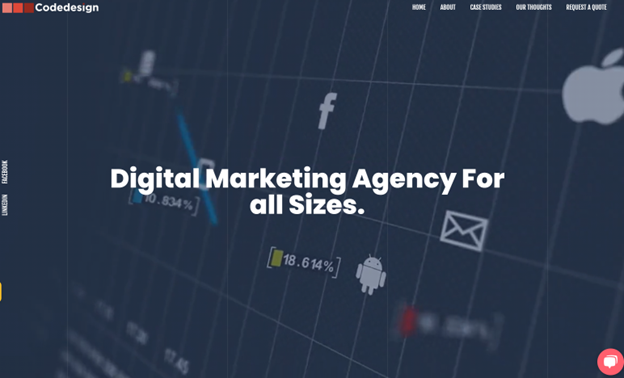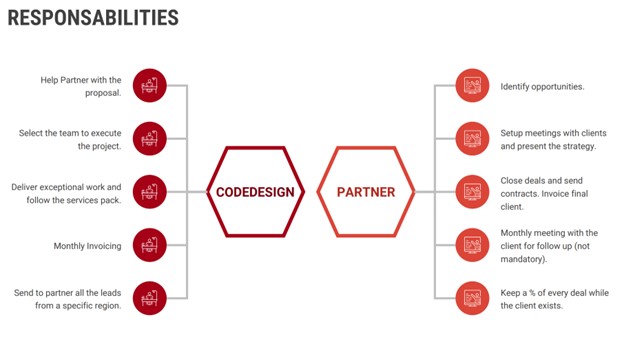13 min to read

What is the role of a digital marketing agency for a small business?
Think of a digital marketing agency as your trusty partner, ready to help your small business conquer the world. We love entrepreneurs and great ideas are our fuel. We've got your back when it comes to building a strong online presence. That means they'll whip up a stunning website that's easy to use, mobile-friendly, and makes a great first impression. Plus, they'll set up your social media accounts so they're looking sharp and ready for action.
Our role as digital marketing agency doesn't stop at setting things up; we help you create a winning strategy to reach an audience online. We will help you figure out which platforms and channels are the best fit for your business and come up with tailored campaigns to get your message out there. We will support your initiatives strategically and within specific scopes as SEO, PPC, content marketing, social media ads, automation, analytics, etc.
And you know what's even better? We will take a lot of your shoulders by keeping an eye on your campaigns, making sure we are delivering top-notch results. We will also track how things are going, dive into the data, and fine-tune your strategy to keep it fresh and effective.
Another awesome thing we will do is to help you connect with your audience on a deeper level.
A digital marketing agency is your go-to buddy for everything online marketing. They help your small business grow by creating a powerful online presence, getting your message out there, and building lasting connections with your customers. With a digital marketing agency on your side, there's no stopping your small business from thriving!
Ok, before we jump into how we can help from a marketing standpoint, let's get into the details on things we recommend business owners.
Embrace Technology
Today, embracing technology has become essential for every business that wants to adapt and stay competitive. Company owners are often looking for the best systems for small businesses in order to speed up and automate certain processes saving both time and money. Technology has revolutionized the marketplace with its limitless capabilities, enabling small businesses to grow and expand in ways that were not possible before.

It has automated various tasks and processes, making it more manageable for business owners to perform necessary tasks such as accounting, inventory management, and customer service. POS systems are another great example of how technology can be used to improve a business’s efficiency and profitability. They allow businesses to record sales, track customer activity, and manage inventory in real-time. This allows for better organization and easier decision-making when it comes time to restock or order new items. Tech is something you simply shouldn't be missing out on.
Learn About Your Target Market
It's essential to know who your customers are, what they want, and how to reach them. Without this information, your advertising efforts will likely be ineffective, and you may struggle to generate revenue. By understanding their preferences, shopping habits, and pain points, you can create a more targeted marketing message that resonates with them on a personal level. This can result in higher conversion rates, increased customer loyalty, and ultimately, more profits for your business.
Another benefit of learning about your target market is that it can help you identify new opportunities for growth and innovation. By staying up to date on industry trends and consumer behaviors, you can spot gaps in the market that your business can fill.
Develop A Strong Brand
Developing a strong brand is not just important but crucial for any small business owner. Your brand is the face of your business, and it's the first thing that customers see and associate with what you offer. Some of the main reasons why this is important are better customer recognition, competitive edge, trust and credibility, and brand loyalty. Here are some ways to achieve this:
- define your values
- create a unique brand identity
- create a style
- build a strong online presence
- leverage feedback
- differentiate from competitors
- build brand awareness
- be consistent
- continually evolve it
A strong brand will not only attract new customers but also help retain existing ones. This is a fundamental aspect of growing and sustaining a small business. By creating a memorable and trustworthy brand identity, you increase your chances of success and growth in a competitive marketplace.
Create A Network
Creating a network can be the difference between a business that thrives and one that fails. It's essentially a group of people who work together to achieve a common goal. In the context of small business owners, a network can be made up of other small business owners, suppliers, customers, and even friends and family members.
One of the most important reasons small business owners should do this is that it can help create new opportunities. For example, a small business owner might meet someone through their network who can provide them with new clients, or who has a particular skill or expertise that the business owner needs. Also, if you're part of a network, they are seen as being more credible and trustworthy, which can make it easier for them to attract new customers and clients.
Keep Track Of Finances
Keeping track of finances involves recording every transaction, managing expenses, and ensuring that the books are balanced. Despite the challenges, every small business owner must prioritize having a financial system in place.
One of the most important reasons small business owners should keep track of their finances is to monitor cash flow. Keeping a record of all expenses and income ensures that they know precisely how much money is flowing in and out of the business. With this information, they can identify areas where they can cut costs and optimize their revenue streams.
Another advantage is that it helps businesses stay compliant with the law. Every business is legally required to keep accurate financial records. Failing to do so can result in penalties and fines. Therefore, small business owners who keep track of their finances can avoid legal issues and stay on top of their bookkeeping.
Focus On Customer Service
The impact of positive customer service experiences can go a long way in generating recurring business for you. Research shows that the majority of dissatisfied clients never return to a business, nor do they usually complain or provide input on how the business could improve. Therefore, good customer service is not just about keeping your customers satisfied, but also retaining them by creating a customer service culture that spreads through word of mouth.
Providing superior customer service doesn't necessarily mean exceeding your customer's expectations, it can be as simple as delivering on what you promised. For instance, returning calls and emails promptly, being polite and helpful, as well as actively listening to your customer's concerns. Moreover, training employees to handle customers professionally is another key element to providing excellent customer service.
Build A Strong Team
As a small business owner, building a strong team is one of your most crucial tasks. The strength of your team often determines the success or failure of your business. Therefore, it’s essential to understand how to build and maintain a strong team.
The right employee should also fit your company’s culture well, share your goals and values, and have a positive attitude. You should also consider their potential for growth and how they can contribute to the long-term success of your business.
Additionally, team-building activities like company retreats, lunches, and volunteering can build strong bonds, promote collaboration, and increase morale. Finally, encourage open communication channels so everyone is comfortable speaking their mind.

It is essential for small business owners to understand the importance of networking, keeping track of finances, providing excellent customer service, and building a strong team. By leveraging these strategies, small business owners can increase their chances for success and create new opportunities. Networking helps build credibility and trustworthiness while tracking expenses ensures that cash flow remains healthy. Providing superior customer service will help retain customers while investing in employee development encourages collaboration and increases morale!
How can a digital marketing agency help with this? Here are a few tips to navigation.

Let's chat about some key things every business owner needs to understand to make their digital marketing efforts shine.
First up, know your audience. Before diving into any digital marketing strategy, it's essential to understand who you're trying to reach. Do some research to figure out your target audience's needs, preferences, and online behaviors.
Next, be where your audience is. Once you know who you're targeting, you must find out where they hang out online. This could be on social media platforms, forums, or blogs. Ensure your business has a presence on those channels and actively engages with potential customers.
Content is king! High-quality, engaging content is the backbone of any digital marketing strategy. Whether it's blog posts, videos, or social media updates, make sure your content is relevant, informative, and entertaining. This will help you attract and retain your audience.
Don't forget about search engine optimization (SEO). SEO is about ensuring your website ranks well on search engine results pages. Learn about on-page and off-page SEO techniques to help your website appear when potential customers search for products or services like yours.
Get Social! Social media is a powerful tool for connecting with your audience, building brand awareness, and driving traffic to your website. Be active on your audience's platforms and engage with them by responding to comments and messages.
Paid advertising can give you a boost. While organic reach is essential, sometimes you need a little extra help to get your message out there. Consider using paid advertising like Google Ads or social media ads to target specific audiences and drive traffic to your website.
Track and analyze your results. Keep an eye on your digital marketing efforts to see what's working and what's not. Use tools like Google Analytics to track your website traffic, social media performance, and other key metrics. This will help you fine-tune your strategy and get better results over time.
In a nutshell, digital marketing is all about knowing your audience, creating engaging content, being active on the right channels, and constantly improving your strategy. Keep these tips in mind as you navigate the world of digital marketing, and you'll be on your way to online success!
Need help creating a media plan? Let's dive into the most important things you should consider while putting together a killer media plan for your client.
First, let's talk about defining your objectives. Before you start creating any media plan, knowing what you want to achieve is crucial. Are you looking to boost brand awareness, drive sales, or engage with your audience? Having clear objectives will help guide your strategy and make it more effective.
Next, know your audience inside and out. It's essential to deeply understand who you're trying to reach with your media plan. Research your target audience's demographics, interests, and online behaviors to create a plan that truly resonates with them.
Alright, now it's time to think about your budget. Every great media plan considers how much you're willing to spend to achieve your objectives. Be realistic and allocate your budget wisely to get the most bang for your buck.
Let's talk channels. With so many platforms and channels out there, it's essential to focus on the ones that will be most effective for reaching your audience. Consider where your target audience spends their time online and prioritize those channels in your plan. Consistency is key. Ensure your media plan maintains a consistent brand image and messaging across all channels. This helps build a strong brand identity and ensures your audience has a cohesive experience with your brand.
Keep an eye on your competition. Analyzing your competitors' media strategies can give you valuable insights and help you identify gaps in the market that your plan can address. Use this information to make your media plan stand out from the crowd.
Now, think about timing. Consider the best times to reach your audience when creating your media plan. This might involve looking at specific days of the week, times of day, or seasonal trends that impact your target market.
Monitoring and adjusting is super important. Once your media plan is in action, keep a close eye on performance and be ready to make adjustments as needed. Use analytics tools to track your results and fine-tune your strategy to get the best results possible.
Finally, let's talk about reporting. Your media plan should include a system for tracking and reporting on your campaign's performance. This will help you demonstrate the success of your plan to your client and inform future strategies.
What are the key steps to get your online business off the ground and make it a success?

First off, let's talk about building an online presence. You'll want to start by creating a user-friendly, mobile-optimized website that represents your brand well. Your website is your digital storefront!
- Set up social media platforms where your target audience identifies your USPs. This could be Facebook, Instagram, LinkedIn, Twitter, or other platforms relevant to your niche. Make sure your profiles are polished and showcase your personality.
- Create high-quality, engaging content for your target audience. These could be blog posts, videos, podcasts, or social media. The key is to create relevant, informative, and entertaining content to keep your audience interested and coming back for more.
- This content will help your Search engine optimization (SEO) equally important for any online business. Optimize your website and content for search engines like Google to ensure potential customers can find you. This involves researching keywords, optimizing meta tags, and creating high-quality backlinks, among other things.
- Paid advertising can boost your online business and has an immediate impact. Use platforms like Google Ads or social media advertising to target specific audiences and drive traffic to your website. This can be an effective way to grow your customer base, especially in the early stages.
- Email marketing is another powerful tool (if you have emails ofc). Build an email list by encouraging website visitors to sign up for your newsletter or offering a lead magnet, like a free ebook or discount code. Then, send regular updates and promotions to your subscribers to keep them engaged and returning for more.
-Don't forget about Google Search Console and Google Analytics! Use these tools to monitor your website traffic, performance, and other key metrics. This will help you fine-tune and get better results over time.
Engage with your audience and provide excellent customer service. Respond to comments and messages on social media, and make sure your customers feel heard and valued. This will help you build a loyal community around your online business and foster long-term relationships.
Lastly, be patient and persistent. Growing an online business takes time, so don't get discouraged if you don't see immediate results. Keep refining your digital marketing strategy, learning from your mistakes, and celebrating your successes.
What does Codedesign do, as a startup to build it's audience?

Codedesign is also a B2B startup, so let's use our example and some financially effective marketing ideas, and we will give some examples and case studies about us. Let's chat about some cost-effective ways to get your B2B marketing game on point without breaking the bank.
First, we rely a lot on content marketing (as this article you are reading). We spend a lot of time creating high-quality, valuable content like blog posts, whitepapers, or case studies that can help us attract our target audience and position us as industry experts. For example, we have an awesome blog with in-depth articles on digital marketing topics, showcasing their expertise and attracting potential clients.
Next up, we use the power of social media. Choose the platforms where your target audience is most active (we use LinkedIn, Twitter and Facebook) to start engaging with potential customers. We have an active presence on LinkedIn, where we share content, engage with our audience, and build relationships to boost the brand's visibility and credibility.
Email marketing is also very important to us. Building a solid email list is a cost-effective way to stay in touch with our prospects and keep them informed about your offerings. We send out automatic regular newsletters with digital content, updates, and promotions, nurturing leads.
We never overlook the power of SEO. Optimizing our website (we do it every day) and content for search engines can help attract organic traffic. At Codedesign.org, for example, we have a well-optimized website with informative content that ranks well in search engine results, driving more potential clients in.
Webinars and online events are also very cost-effective for showcasing our expertise and generating more leads. We host webinars on various digital marketing topics, attracting attendees from our target audience and helping establish their authority in the industry.
Digital Marketing case studies are a powerful tool to demonstrate the value of our services. Our features and case studies, showcase the results we've achieved for our clients and build trust with potential customers.
Consider offering free resources or tools to attract and engage your target audience. At Codedesign.org, for example, we offer a free SEO audit tool, providing value to their audience and generating leads for their services.
Leverage your existing network to spread the word about your startup. Codedesign.org's team members are active in industry groups and events, allowing them to share their expertise and connect with potential clients more personally.
Finally, always measure and analyze your marketing efforts. Codedesign.org uses analytics tools to track the performance of their marketing campaigns, allowing them to optimize their strategies and make data-driven decisions for better results.
So, there you have it! By following these financially effective marketing ideas, along with the examples and case studies from Codedesign.org, your B2B startup can make a significant impact without breaking the bank.
Ok, may you give me some examples of how Code helps small business owners?

Our agency worked with a super cool eco-friendly products startup. They had an amazing line of sustainable products but needed a strong online presence to spread the word. We built them a fabulous website optimized for desktop and mobile, showcasing their products and brand story. Before we knew it, their online sales were soaring!
We also had a blast partnering with an ed-tech startup all about making learning fun and accessible. We created engaging, informative content like blog posts, explainer videos, and interactive quizzes. This content demonstrated their expertise and helped build a community of enthusiastic learners around their brand.
Another special project involved a B2B software startup. We focused on crafting in-depth case studies showcasing their software solutions' real-world impact. These case studies became a powerful marketing tool, convincing potential clients of the value their software could bring to their businesses.
Social media played a starring role in the success of a health and wellness startup we collaborated with. We dove headfirst into Instagram and Facebook, creating eye-catching visuals and posting regularly. We also engaged with our audience, answering questions and hosting live Q&A sessions. The result? A loyal and growing fanbase!
One of our favorite projects involved launching a local restaurant's online presence. We set up Google My Business and optimized their website for local SEO, helping them attract customers from the neighborhood. We also dabbled in email marketing, sending out weekly newsletters with special offers and mouth-watering food photos that kept customers coming back for more.
We can't forget when we helped an e-commerce startup focus on handmade crafts. We used influencer marketing to reach their target audience, collaborating with popular DIY and lifestyle bloggers. These influencers shared the startup's products with their followers, significantly boosting brand awareness and sales.
Working with a fintech startup was an exhilarating experience, too. We delved into the world of LinkedIn and Twitter, engaging with industry leaders and sharing valuable content related to personal finance and investment. This helped the startup build credibility and trust with potential clients, making them stand out in a competitive industry.
Another success story comes from a startup in the travel industry. We created a blog series featuring stunning photography and captivating travel stories. We also used social media and email marketing to share these stories with a wider audience. This combination of storytelling and digital marketing helped the startup attract an engaged community of travel enthusiasts.
A gratifying project involved a nonprofit startup focused on clean water initiatives. We designed a compelling digital marketing campaign with an interactive website, social media presence, and email marketing. This campaign helped raise awareness for the cause and increased donations, enabling the startup to make a real impact on communities in need.
Last but not least, we worked with an innovative fitness startup. We developed a comprehensive digital marketing strategy, including a user-friendly website, a content-rich blog, and an engaging social media presence. This multi-pronged approach helped the startup reach fitness enthusiasts and establish itself as a trusted source of information and motivation.
So there you have it! Those are just a few incredible adventures our digital marketing agency has had launching startups. It's been a wild ride, but we wouldn't change it for the world!

About Bruno GavinoBruno Gavino is the CEO and partner of Codedesign, a digital marketing agency with a strong international presence. Based in Lisbon, Portugal, with offices in Boston, Singapore, and Manchester (UK) Codedesign has been recognized as one of the top interactive agencies and eCommerce agencies. Awarded Top B2B Company in Europe and Top B2C company in retail, Codedesign aims to foster personal relationships with clients and create a positive work environment for its team. He emphasizes the need for digital agencies to focus on data optimization and performance to meet the increasingly results-driven demands of clients. His experience in digital marketing, combined with a unique background that includes engineering and data, contributes to his effective and multifaceted leadership style. |

About CodedesignCodedesign is a digital marketing agency with a strong multicultural and international presence, offering expert services in digital marketing. Our digital agency in Lisbon, Boston, and Manchester enables us to provide market-ready strategies that suit a wide range of clients across the globe (both B2B and B2C). We specialize in creating impactful online experiences, focusing on making your digital presence strong and efficient. Our approach is straightforward and effective, ensuring that every client receives a personalized service that truly meets their needs. Our digital agency is committed to using the latest data and technology to help your business stand out. Whether you're looking to increase your online visibility, connect better with your audience, get more leads, or grow your online sales. For more information, read our Digital Strategy Blog or to start your journey with us, please feel free to contact us. |
CodeDesign is leading:
- Digital Agency
- Digital Marketing Agency
- Digital Ecommerce Agency
- Amazon Marketing Agency


Add comment ×